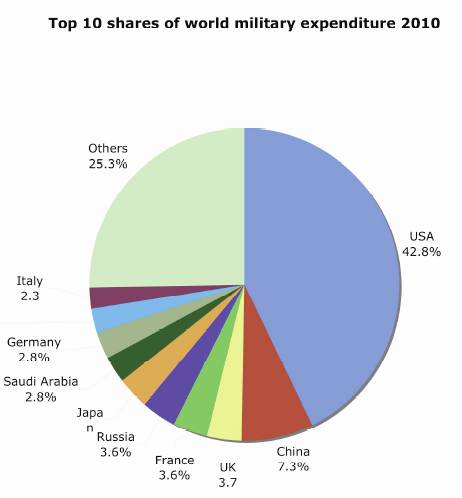"Ultimately, nations must be responsible for their fair share of the common defense." (NATO) requiring the U.S., once more, to make up the difference. 
Retiring U.S. Defense Secretary Robert Gates didn't even try to hide his frustration. In his Brussels farewell address this week, Gates used words such as "dim, if not dismal" to describe the future of NATO, an organization that "despite [having] more than two million troops in uniform, not counting the U.S. military," has trouble sustaining "a deployment of 25,000 to 45,000 troops."
Other Points of interest Transcript from Defense Secretary Gates
In the past, I’ve worried openly about NATO turning into a two-tiered alliance: Between members who specialize in “soft’ humanitarian, development, peacekeeping, and talking tasks, and those conducting the “hard” combat missions.
Between those willing and able to pay the price and bear the burdens of alliance commitments, and those who enjoy the benefits of NATO membership – be they security guarantees or headquarters billets – but don’t want to share the risks and the costs. This is no longer a hypothetical worry. We are there today. And it is unacceptable.
Part of this predicament stems from a lack of will, much of it from a lack of resources in an era of austerity. For all but a handful of allies, defense budgets – in absolute terms, as a share of economic output – have been chronically starved for adequate funding for a long time, with the shortfalls compounding on themselves each year.

...I am the latest in a string of U.S. defense secretaries who have urged allies privately and publicly, often with exasperation, to meet agreed-upon NATO benchmarks for defense spending. However, fiscal, political and demographic realities make this unlikely to happen anytime soon, as even military stalwarts like the U.K have been forced to ratchet back with major cuts to force structure. Today, just five of 28 allies – the U.S., U.K., France, Greece, along with Albania – exceed the agreed 2% of GDP spending on defense.
Regrettably, but realistically, this situation is highly unlikely to change. The relevant challenge for us today, therefore, is no longer the total level of defense spending by allies, but how these limited (and dwindling) resources are allocated and for what priorities.
Please see full Transcript of Defense Secretary Gates
NATO Spending Fact$$$$$
Non-U.S. NATO members collectively spend more than $300 billion U.S. dollars on defense annually. The U.S. $680 billion


Retiring U.S. Defense Secretary Robert Gates didn't even try to hide his frustration. In his Brussels farewell address this week, Gates used words such as "dim, if not dismal" to describe the future of NATO, an organization that "despite [having] more than two million troops in uniform, not counting the U.S. military," has trouble sustaining "a deployment of 25,000 to 45,000 troops."
Other Points of interest Transcript from Defense Secretary Gates
In the past, I’ve worried openly about NATO turning into a two-tiered alliance: Between members who specialize in “soft’ humanitarian, development, peacekeeping, and talking tasks, and those conducting the “hard” combat missions.
Between those willing and able to pay the price and bear the burdens of alliance commitments, and those who enjoy the benefits of NATO membership – be they security guarantees or headquarters billets – but don’t want to share the risks and the costs. This is no longer a hypothetical worry. We are there today. And it is unacceptable.
Part of this predicament stems from a lack of will, much of it from a lack of resources in an era of austerity. For all but a handful of allies, defense budgets – in absolute terms, as a share of economic output – have been chronically starved for adequate funding for a long time, with the shortfalls compounding on themselves each year.

...I am the latest in a string of U.S. defense secretaries who have urged allies privately and publicly, often with exasperation, to meet agreed-upon NATO benchmarks for defense spending. However, fiscal, political and demographic realities make this unlikely to happen anytime soon, as even military stalwarts like the U.K have been forced to ratchet back with major cuts to force structure. Today, just five of 28 allies – the U.S., U.K., France, Greece, along with Albania – exceed the agreed 2% of GDP spending on defense.
Regrettably, but realistically, this situation is highly unlikely to change. The relevant challenge for us today, therefore, is no longer the total level of defense spending by allies, but how these limited (and dwindling) resources are allocated and for what priorities.
Please see full Transcript of Defense Secretary Gates
NATO Spending Fact$$$$$
Non-U.S. NATO members collectively spend more than $300 billion U.S. dollars on defense annually. The U.S. $680 billion
That is NOT the worst of it...
Look at what the interest load will do to our future of being able to defend ourselves (Wiki)
